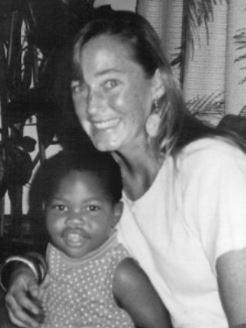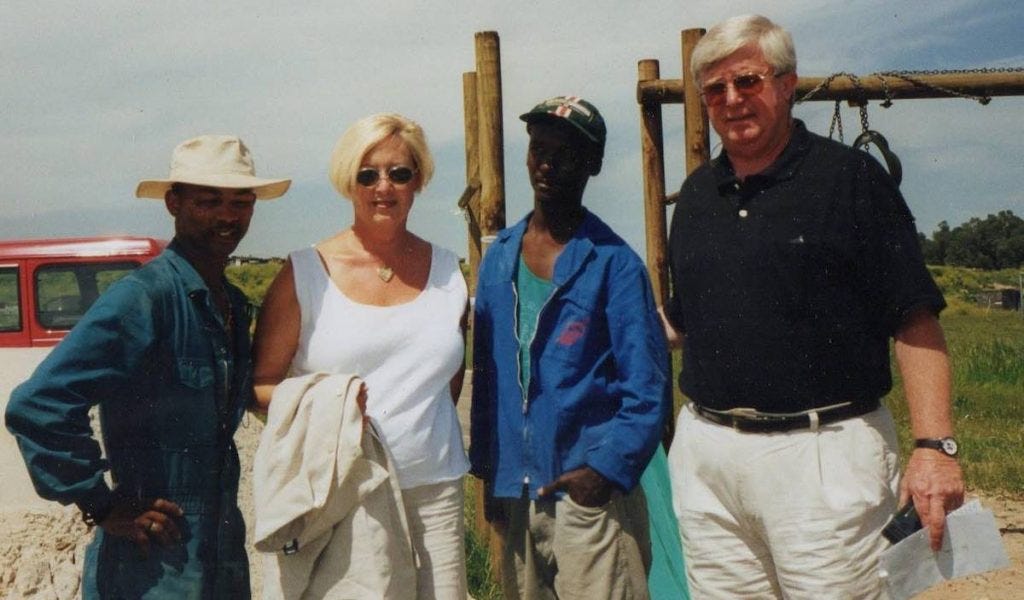We see with our eyes. We recognize with our hearts.
Losing one life; recognizing two others into existence.
People take up residency inside of us.
People who warm our hearts when they say just the right thing. People who inspire us with their courage. Those who enchant us – our first kiss. A deep love who becomes a lifelong soulmate. Even those who irritate us and hurt us.
Our inhabitants work on us from the inside out. They challenge us. They encourage us. They teach us. They shape us. Without realizing it, they influence who we become.
Thirty years ago, Peter and Linda Biehl, two people I’d never met, checked into a room inside me – coming by way of the nightly news. Parents of four children, career professionals, and Sunday school teachers, they were a conventional couple living a typical life in Newport Beach, California, when they confronted every parent’s nightmare.
The lead story was their twenty-six-year-old daughter, Amy. A high school valedictorian, champion diver, and accomplished swimmer, Amy excelled in everything she poured herself into. While earning her degree from Stanford University, her giant and service-oriented heart discovered a passion for South Africa and the plight of the Apartheid-oppressed black population. At graduation, she wore a cap with the words “Free Mandela” across the front.
After college, Amy’s desire to help bring lasting change in South Africa intensified. She won a Fulbright scholarship to work on the post-apartheid future and touched down in Cape Town in 1992.
It was a restive time – fifty years of Apartheid rule had been officially repealed, and the country was caught between its awful past and its promising future. Trust was low. Tensions were high. Radical whites were desperate to remain in power. Radical blacks didn’t trust that whites would relinquish their rule. Both sides waged an unofficial war on each other. Sixteen thousand died over three years.
Two days before she was to fly home, blonde-haired and blue-eyed Amy was dragged from her car by a 100-strong mob, stoned unconscious, and stabbed to death on the side of the road – killed by the very people she was working to help.
As I tried to wrap my mind around the horror, Amy’s murder hit closer to home when I learned she was planning to marry a high school friend of mine. My heart ached. My gut wrenched. And my attention kept returning to Peter and Linda.
I was twenty-seven, had no children, and kept wondering, what does the pain of losing a child feel like? How does one contend? How would you even go on?
These questions hung in the air of the room Peter and Linda occupied inside me.
Six weeks after Amy’s death, Peter and Linda set out for Cape Town. They visited the site of Amy’s murder. They met political leaders Amy worked with to craft the country’s new constitution. They retraced her steps through townships where she helped register blacks to vote.
Peter and Linda were moved to become part of the solution. They set up the Amy Biehl Foundation and focused its mission on breaking the vicious cycle of violence through youth programs, skills training, and literacy initiatives. A short time later, Peter and Linda gave up their careers in the US and reoriented their lives to transforming South Africa – just as Amy had.
How did Peter and Linda find the strength to travel halfway around the world – into the violence, into the pain – only six weeks after Amy’s murder? I’d spent my life avoiding pain, and when I couldn’t, I’d do my best to deflect it. I felt sure I’d remain stuck in place, paralyzed by grief.
Where could I find that strength? What did Peter and Linda possess that I didn’t?
Questions are lanterns we swing ahead of us to see in the dark. – Mark Nepo
A year later, the four men responsible for inflicting the final blows that killed Amy stood trial. With Linda looking on in the courtroom, all sat motionless and expressed no remorse. Each was found guilty. The prosecution sought the death penalty. The judge rejected the request, saying that despite their lack of remorse, the killers could be rehabilitated. Each was sentenced to 18 years in prison.
Peter and Linda were asked if they were disappointed that the judge didn’t impose the death penalty. They answered that killing Amy’s assailants wasn’t going to bring her back, adding that they, too, hoped her killers could be rehabilitated.
Rehabilitated, I thought? Really?
Could I sit in the same courtroom as my daughter’s killers, look in their eyes, see no remorse, and hope for rehabilitation? I knew my answer and I wished it was different.
How was it that Peter and Linda could choose empathy over vengeance? What could they see that I couldn’t? A kernel deep inside me yearned for what Peter and Linda had.
I kept swinging the questions, waiting for answers to emanate.
In 1996, three years after Amy’s murder, newly elected president Nelson Mandela established the Truth and Reconciliation Commission. The commission sought to bring forth transgressions committed by all parties during Apartheid rule, the premise being that if truth could be accompanied by forgiveness, healing could occur, and a new multi-racial South Africa would be born. Victims would offer unrefuted statements, and for those who committed crimes, if you confessed your guilt to those you harmed, you would not be punished. If you had already been punished, you could apply for amnesty.
In 1997, Ntobeko Peni, Easy Nofemela, Mongesi Manqina, and Vusumzi Ntamo applied for amnesty.
Amy’s killers.
For a second time, Peter and Linda sat face to face with the four men who took Amy’s life. This time, the men admitted to killing Amy, testifying they did not trust that the post-Apartheid reforms would be enough to transform the country.
When it was their turn to speak, Peter and Linda brought forth Amy’s spirit, telling stories of her childhood, showing pictures of her infectious smile, and reading from her valedictory address. They concluded their testimony by telling the commission they supported the reforms in South Africa, just as Amy had, and that they supported amnesty.
Then, Peter and Linda looked at the four men and forgave them.
Outside the hearing, Ntobeko Peni wept, telling Peter and Linda that when they forgave him, he didn’t care if he received amnesty because he had just been freed.
Less than a year later, the four young men who took Amy’s life walked out of prison free men.
When Peter and Linda offered forgiveness, my questions finally illuminated answers – as if a light switch flicked on. Bright, life-changing answers.
I realized I could see the same as Peter and Linda, but they possessed the capacity to recognize – to look beyond what they could see – a subtle but profound difference.
Seeing is external and lives in the past. We say, “I’ve seen it with my own eyes.” Or “I don’t see it.” Seeing is limited by what has happened.
Recognizing involves our insides and contemplates an unseen future. We say, “There’s more than meets the eye.” Or “I recognize the potential in that person.” By accessing virtues in our hearts – empathy, compassion, kindness, courage, hope, forgiveness, faith – recognizing becomes unlimited by expanding the view of what is possible.
With this new lens, I reflected on Peter and Linda’s choices over the years and envisioned what they had recognized.
When Peter and Linda traveled halfway around the world six weeks after Amy’s death, they recognized the way forward was to act – to go on – no matter how hard, and the way through pain was into it, not to avoid it.
When Peter and Linda hoped for rehabilitation, despite no remorse and no proof that anything would be different, they recognized that an unseeable future could be different.
When Peter and Linda supported amnesty, they recognized their role in opening the door for Amy’s killers to manifest a new future.
When Peter and Linda offered forgiveness, they recognized a new future can’t be fully authored while carrying the emotional weight of the past, that everyone has goodness in them, and nobody should be defined solely by their worst action.
On a stage vastly larger than a Sunday school room in Newport Beach, Peter and Linda taught me that while we see with our eyes, we recognize with our hearts.
And even the inconceivable becomes possible when we choose to recognize.
After their release from prison, Ntobeko Peni and Easy Nofemela were determined to chart a new path and make a positive contribution to the next generation. They set up a youth club in Guguletu Township – the very place of Amy’s murder and began an afterschool mentorship program.
Could it be that over five years, two trials, and through hope, empathy, and forgiveness, Peter and Linda slipped into Ntobeko and Easy and took up residency inside them?
A year after establishing their club, Ntobeko and Easy reached out to Peter and Linda and asked to meet. Face to face for only the third time, over dinner, Ntobeko and Easy showed photos of hikes with their afterschool group. They told stories of youth who had found jobs with skills they’d been taught. They showed off T-shirts they’d designed for the kids. By the end of the evening, they were laughing and smiling.
Peter and Linda saw the impact Ntobeko and Easy were having and the men they were becoming. Peter and Linda recognized they could make an even greater impact – together.
Peter and Linda offered Ntobeko and Easy jobs with the Amy Biehl Foundation. They would go on to forge a deep and lasting relationship. Easy spent fifteen years with the foundation, and Ntobeko continues his work there to this day.
Two people who gave Amy her life and two who took it away freed themselves from the weight of the past and came together to change lives and transform a country.
When we recognize with our hearts, the inconceivable, indeed, becomes possible.
May Peter and Linda take up residency inside of you, too.
Photo by Johanna Baldwin: Easy, Linda, Ntobeko, & Peter. Guguletu, Cape Town 1999
I hope this essay touched your heart and brought meaning to your life. Special appreciation to
and for their time and invaluable feedback on this essay.For Further Reading: Amy’s Biehl’s Last Home, by Steven Gish






My. My. My.
My heart is roiling with emotions right now. This is one of the more powerful essays I have read recently. You led us from. This history within you to today (what a powerful opening)
James thank you for taking the time to craft something so delicate and deep. I will be mulling the core idea, but also quizzing who lives within me.
Wow, James. I’m going to second what a lot of people are saying.
At the risk of being repetitive, this piece was so powerful. Some stories, like this, really remind me how tragedy can strike like lightning without the storm cloud - and people are so tough and loving it’s unbelievable.
Thank you for sharing this with the world (: it’s a better place because of it